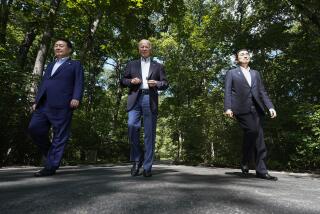Japan Eyes Broader Defense Policy : Clinton’s visit highlights the question: How far will Tokyo go?
- Share via
In reaffirming the U.S.-Japan security relationship, President Clinton and Japanese Prime Minister Ryutaro Hashimoto agreed to some changes that could broaden Japan’s role in maintaining stability in the Asia-Pacific region. But is Japan ready to take on the sensitive issue of a truly expanded role in regional defense? That unsettled question will weigh heavily on its neighbors, who suffered greatly under the Japanese military in World War II.
The end of the Cold War and the Soviet threat prompted questions about U.S. forces in Asia. The U.S.-Japan security agreement has been a device to provide defense for Japan only. Now new tensions, notably between China and Taiwan and between the two Koreas, clearly warrant a continued U.S. military presence in East Asia, a major trading area for American business. As a global economic powerhouse itself, Japan also needs to assume some responsibility for a peaceful Asia. How to do it is the sticky question.
In a joint declaration, Clinton and Hashimoto called the security relationship between their countries the cornerstone of peace and prosperity in Asia. There will be no change in the number of U.S. troops stationed in Asia. It will remain at the current 100,000, which includes 47,000 in Japan.
More significantly, the United States and Japan agreed to greater cooperation in military technology development such as joint research on the F-2 support fighter. Japan also will supply transport services and even weapon parts to U.S. forces during joint training exercises. A review of 1978 guidelines for Japanese cooperation during military crises was also ordered.
These changes are prompting much debate in Japan, as they should. Might Japan participate more widely in collective defense for regional stability and perhaps eventually in combat operations? Tokyo has long held that its antiwar constitution prohibits involvement in any military operations beyond immediate self-defense. Its neighbors are satisfied with that arrangement. But helping the United States police Asia at any level presents new challenges.
More to Read
Sign up for Essential California
The most important California stories and recommendations in your inbox every morning.
You may occasionally receive promotional content from the Los Angeles Times.













